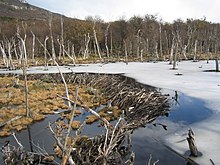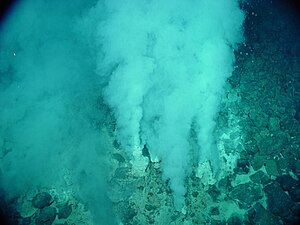Portal:Ecology
| |
|
|
Ecology
|
|
Ecology (from Ancient Greek οἶκος (oîkos) 'house', and -λογία (-logía) 'study of') is the natural science of the relationships among living organisms, including humans, and their physical environment. Ecology considers organisms at the individual, population, community, ecosystem, and biosphere levels. Ecology overlaps with the closely related sciences of biogeography, evolutionary biology, genetics, ethology, and natural history. Ecology is a branch of biology, and is the study of abundance, biomass, and distribution of organisms in the context of the environment. It encompasses life processes, interactions, and adaptations; movement of materials and energy through living communities; successional development of ecosystems; cooperation, competition, and predation within and between species; and patterns of biodiversity and its effect on ecosystem processes. Ecology has practical applications in conservation biology, wetland management, natural resource management (agroecology, agriculture, forestry, agroforestry, fisheries, mining, tourism), urban planning (urban ecology), community health, economics, basic and applied science, and human social interaction (human ecology). The word ecology (German: Ökologie) was coined in 1866 by the German scientist Ernst Haeckel. The science of ecology as we know it today began with a group of American botanists in the 1890s. Evolutionary concepts relating to adaptation and natural selection are cornerstones of modern ecological theory. Ecosystems are dynamically interacting systems of organisms, the communities they make up, and the non-living (abiotic) components of their environment. Ecosystem processes, such as primary production, nutrient cycling, and niche construction, regulate the flux of energy and matter through an environment. Ecosystems have biophysical feedback mechanisms that moderate processes acting on living (biotic) and abiotic components of the planet. Ecosystems sustain life-supporting functions and provide ecosystem services like biomass production (food, fuel, fiber, and medicine), the regulation of climate, global biogeochemical cycles, water filtration, soil formation, erosion control, flood protection, and many other natural features of scientific, historical, economic, or intrinsic value. (Full article...) Selected article -Life is a quality that distinguishes matter that has biological processes, such as signaling and self-sustaining processes, from matter that does not. It is defined descriptively by the capacity for homeostasis, organisation, metabolism, growth, adaptation, response to stimuli, and reproduction. All life over time eventually reaches a state of death and none is immortal. Many philosophical definitions of living systems have been proposed, such as self-organizing systems. Viruses in particular make definition difficult as they replicate only in host cells. Life exists all over the Earth in air, water, and soil, with many ecosystems forming the biosphere. Some of these are harsh environments occupied only by extremophiles. Life has been studied since ancient times, with theories such as Empedocles's materialism asserting that it was composed of four eternal elements, and Aristotle's hylomorphism asserting that living things have souls and embody both form and matter. Life originated at least 3.5 billion years ago, resulting in a universal common ancestor. This evolved into all the species that exist now, by way of many extinct species, some of which have left traces as fossils. Attempts to classify living things, too, began with Aristotle. Modern classification began with Carl Linnaeus's system of binomial nomenclature in the 1740s. (Full article...)Selected image -Some Hydrothermal vents support peculiar ecosystems, based on dissolved minerals. Hydrothermal vent communities are able to sustain such vast amounts of life because vent organisms depend on chemosynthetic bacteria for food. The water that comes out of the hydrothermal vent is rich in dissolved minerals and supports a large population of chemo-autotrophic bacteria.
General imagesThe following are images from various ecology-related articles on Wikipedia.
Related WikiProjectsThings you can do
Entries here consist of Good and Featured articles, which meet a core set of high editorial standards.
 An invasive species is an introduced species to an environment that becomes overpopulated and harms its new environment. Invasive species adversely affect habitats and bioregions, causing ecological, environmental, and/or economic damage. The term can also be used for native species that become harmful to their native environment after human alterations to its food web. Since the 20th century, invasive species have become a serious economic, social, and environmental threat worldwide. Invasion of long-established ecosystems by organisms is a natural phenomenon, but human-facilitated introductions have greatly increased the rate, scale, and geographic range of invasion. For millennia, humans have served as both accidental and deliberate dispersal agents, beginning with their earliest migrations, accelerating in the Age of Discovery, and accelerating again with international trade. Notably invasive plant species include the kudzu vine, giant hogweed, Japanese knotweed, and yellow starthistle. Similarly invasive animals include European rabbits, domestic cats, and carp. (Full article...)Selected biography -Frances Crews James (born September 29, 1930) is an American ecologist who served as a Professor of Biological Sciences at Florida State University. James studied geographic variation in the size and shape of birds, leading to transplant experiments with red-winged blackbirds and to tests of the theoretical assumptions underlying selection models. She is a member of the American Academy of Arts and Sciences. James, originally from Philadelphia, Pennsylvania, was immersed in the stream of biology at an early age being involved in the Academy of Natural Sciences Expeditions for Everyone. (Full article...)Did you know (auto-generated)
Selected quote -
Ecology news
Additional News Highlights
Selected publication -The Journal of Animal Ecology is a peer-reviewed scientific journal publishing research in all areas of animal ecology. It began publication in 1932, and as such is the second oldest journal of the British Ecological Society (after the Journal of Ecology). The Journal of Animal Ecology is available both in print and online. (Full article...) Related portalsMore did you know -Related articlesAssociated WikimediaThe following Wikimedia Foundation sister projects provide more on this subject:
Web resources
Discover Wikipedia using portals |

















































